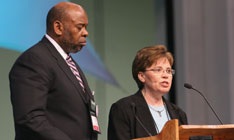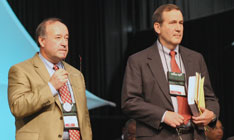Following a declaration that "the budget defines who we are and what we believe" as the church, the 2008 United Methodist General Conference approved a $642 million denominational spending plan for the next four years built around four areas of mission and ministry.
"(The budget) is our mission statement of what God is calling us as people of The United Methodist Church to be about in the world," said Bishop Mary Ann Swenson, president of the church's finance agency, in presenting the proposed budget on May 2, the final day of the 10-day legislative assembly.

The Rev. Jonathan Holston and Marilyn Moore present legislative reports on the church's finances.
"We are the cup from which will flow the funds for mission and ministry of The United Methodist Church," said Bishop John Hopkins, chairman of the Connectional Table, a churchwide leadership group that collaborated to develop the budget with the General Council on Finance and Administration (GCFA), the Council of Bishops and the church's 13 denominational agencies.
With minimal discussion, the delegates approved the budget by a vote of 750-28 and later approved the "apportionment formula" by which it is funded through money requested of the church's 63 U.S. annual (regional) conferences and their local congregations. Less than 2 percent of the money placed in local church offering plates goes to fund denominational ministries and administration.
Hopkins said the budget was developed to strike a balance between the needs and ministries of congregations and annual conferences "with the calling that God is making to our denomination to be out in the world."
Focusing the church's resources
The budget represents a 4.8 percent increase over the 2005-2008 spending plan of $612.5 million approved by the 2004 General Conference.
The $642 million budget translates into a 1.2 percent increase over each of the next four years. Church finance leaders acknowledge this does not keep pace with projections for inflation, but say the amount is sufficient.
For the first time, the budget was developed on an outcome-based model shaped around the denomination's four areas of focus for the immediate future:
- Developing principled Christian leaders;
- Creating new places for new people by starting new congregations and renewing existing ones;
- Engaging in ministries with the poor;
- Improving global health, especially attacking the killer diseases of poverty.
"We have the opportunity to celebrate the abundance that God has poured out for mission into the world," Swenson said.
Committed to stay within the proposed $642 million bottom line, the GCFA and Connectional Table worked with the church's general agencies to accommodate almost $3.7 million in unbudgeted items approved by the General Conference in its earlier business.

The Rev. Larry Homitsky and Don House listen to discussion.
Those items include $2 million to support theological education in Africa, where The United Methodist Church is experiencing its largest growth; $600,000 to study structural issues related to the church's increasingly global nature; $400,000 to help develop the African-American Methodist Heritage Center created by the 2004 General Conference; $290,000 for the committee on central conference affairs to address matters of the church outside of the United States; $300,000 for a new committee to study matters of faith, doctrinal teaching, order and discipline; $115,000 for the church's Judicial Council to have a part-time clerk and records maintenance; and $50,000 for the Sand Creek Massacre National Historic Site in Colorado.
The unbudgeted expenses were absorbed mostly by denominational agencies through some budget adjustments and mostly reserve funds. However, members of the Connectional Table and GCFA governing board meeting on the previous evening to discuss the items expressed concern that such reserve funds cannot be an automatic pool for funding General Conference initiatives.
"We need to understand that that's not sustainable for the future," said Kristina Gonzales, a member of the Connectional Table from Seattle.
Swift approval
The budget process on the floor of General Conference took just over an hour of business and stood in stark contrast to 2004, when the assembly met in Pittsburgh and wrangled with the budget for more than three hours, including parliamentary maneuvering and numerous motions from the floor.
This time, however, only one motion came from the floor, asking to reallocate money from United Methodist Communications for additional radio ministries in Africa. The motion from the Rev. Joe Kilpatrick of the North Georgia Annual (regional) Conference was referred to the Connectional Table for further study.
It was the first time the denominational budget was prepared by GCFA in collaboration with the 4-year-old Connectional Table, which includes representatives from the Council of Bishops, churchwide agencies, U.S. jurisdictions, conferences outside of the United States, racial/ethnic caucuses and young adults.
"In 2004, this General Conference asked us to bring vision, mission and money together at the same table and come back, and we have done it," Hopkins told the assembly.
Collaboration and consensus-building
Budget leaders credited a spirit of collaboration and an early start.
"I think a definite reason for the success is that this process started two years ago," said the Rev. Larry Homitsky, a delegate from Western Pennsylvania who chaired the assembly's budget subcommittee.
"A second reason," he said," is that our subcommittee and legislative committee really took to heart the spirit of holy conferencing. Whenever there was a disagreement or differing opinion, people listened so that we could reach a consensus of what is the best thing for the church."
Among those concerns, he said, was the dramatic increase in the cost of the church's Episcopal Fund, which supports 69 active and 89 retired bishops. The fund has grown by almost 28 percent since 2005 and is projected to grow more than 13 percent by 2012.
The delegates referred the matter to GCFA and the Connectional Table for further study and recommendations.
Another concern was the amount of unrestricted reserve funds held by denominational church agencies. GCFA officials list the agencies' net reserve assets at $292 million, primarily designated for specific purposes over time, and have pledged to provide a more specific accounting in advance of future General Conferences.
*Aldrich is news editor of United Methodist News Service.
News media contact: Marta Aldrich, e-mail: newsdesk@umcom.org.
Phone calls can be made to the General Conference Newsroom in Fort Worth, Texas, at (817) 698-4405 until May 3. Afterward, call United Methodist News Service in Nashville, Tenn., at (615) 742-5470.
Related Articles
General Conference headlines
Resource
Like what you're reading? Support the ministry of UM News! Your support ensures the latest denominational news, dynamic stories and informative articles will continue to connect our global community. Make a tax-deductible donation at ResourceUMC.org/GiveUMCom.




